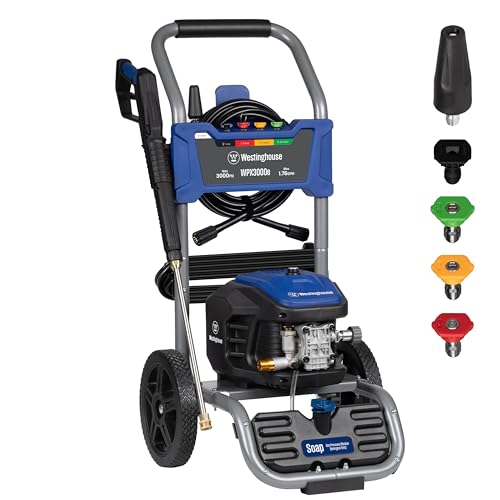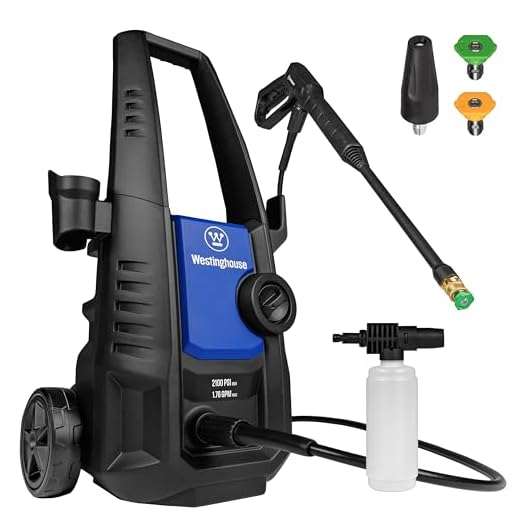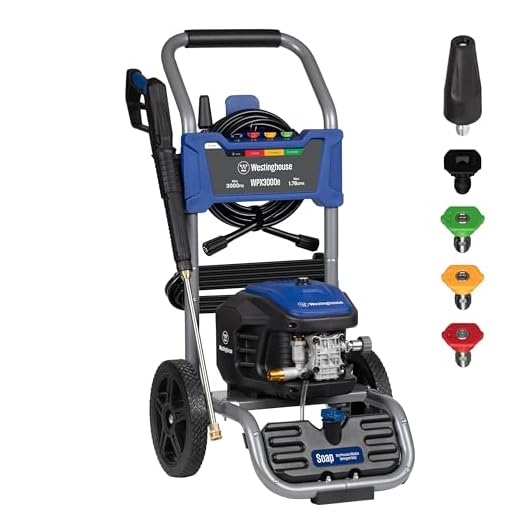Blog
How Powerful Does A Pressure Washer Need To Be

When it comes to pressure washers, power is an essential factor to consider. The power of a pressure washer is determined by its pressure and flow rate, which determines how effectively it can clean different surfaces. But how powerful does a pressure washer really need to be?
First and foremost, the power of a pressure washer should be sufficient to tackle the cleaning tasks you have in mind. Different cleaning tasks require different levels of power. For example, if you only need to clean small patio furniture or delicate surfaces like glass windows, a low-powered pressure washer with a pressure of around 1,500-2,000 PSI should be enough.
On the other hand, if you are planning to clean larger outdoor areas like driveways or decks, or if you need to remove tough stains and grime, you will need a more powerful pressure washer. A medium-powered pressure washer with a pressure of around 2,000-2,800 PSI should be suitable for these tasks. However, for heavy-duty cleaning tasks like stripping paint or removing graffiti, a high-powered pressure washer with a pressure of 2,800 PSI or more will be required.
It is important to note that using a pressure washer with too much power for a particular task can cause damage to the surface you are cleaning. For example, using a high-powered pressure washer to clean delicate surfaces can result in cracks or breaks. Therefore, it is crucial to choose a pressure washer with the appropriate power for your specific cleaning needs.
What Determines Pressure Washer Power?
The power of a pressure washer is determined by several factors, including its motor or engine, water flow rate, and maximum pressure. Understanding these factors can help you choose a pressure washer that meets your specific cleaning needs.
Motor or Engine
The motor or engine of a pressure washer is responsible for powering the pump, which creates the high-pressure water flow. Electric pressure washers typically have motors that range in power from 1,200 to 2,000 watts, while gas-powered pressure washers have engines that range from 1.5 to 10 horsepower. Generally, the higher the motor or engine power, the more powerful the pressure washer.
Water Flow Rate
The water flow rate, measured in gallons per minute (GPM), determines the speed at which the pressure washer can clean surfaces. A higher flow rate means more water is being ejected, which can help remove dirt and debris more effectively. Pressure washers typically have flow rates ranging from 1 to 4 GPM.
Maximum Pressure
The maximum pressure, measured in pounds per square inch (PSI), determines the force at which the water is expelled from the pressure washer. A higher maximum pressure allows for more effective cleaning of tough stains and grime. Pressure washers typically have maximum pressures ranging from 1,200 to 3,000 PSI for home use, while commercial-grade pressure washers can have maximum pressures of up to 5,000 PSI.
| Factor | Range for Home Use | Range for Commercial Use |
|---|---|---|
| Motor or Engine Power | 1,200 – 2,000 watts (electric) 1.5 – 10 horsepower (gas) |
N/A |
| Water Flow Rate | 1 – 4 GPM | N/A |
| Maximum Pressure | 1,200 – 3,000 PSI | Up to 5,000 PSI |
When choosing a pressure washer, it’s important to consider the specific cleaning tasks you’ll be performing. A lower-powered pressure washer may be sufficient for lighter cleaning tasks, such as washing cars or patio furniture, while a higher-powered pressure washer may be necessary for tougher jobs, such as removing stubborn stains from driveways or cleaning large surfaces.
Additionally, it’s important to note that using too much pressure can damage certain surfaces, so it’s essential to choose a pressure washer with settings that can be adjusted to accommodate different cleaning needs.
In conclusion, the power of a pressure washer is determined by its motor or engine power, water flow rate, and maximum pressure. By understanding these factors and considering your specific cleaning needs, you can choose a pressure washer that will provide the power and performance required for the task at hand.
Water Flow Rate
When considering the power and effectiveness of a pressure washer, it is important to also take into account the water flow rate. The water flow rate is the amount of water that the pressure washer can deliver in a given period of time, typically measured in gallons per minute (GPM).
The water flow rate is a crucial factor in determining the cleaning ability of a pressure washer. A higher flow rate means more water is being delivered to the surface, allowing for a faster and more efficient cleaning process. On the other hand, a lower flow rate may result in a weaker cleaning performance, as there is not enough water to effectively remove dirt and grime.
It is important to match the water flow rate of the pressure washer to the cleaning task at hand. For light-duty cleaning tasks such as washing a car or cleaning a patio, a lower flow rate of around 1.5 to 2.5 GPM may be sufficient. However, for more heavy-duty tasks such as removing stubborn stains or cleaning large outdoor surfaces, a higher flow rate of 2.5 to 4 GPM or more may be necessary.
In addition to the cleaning ability, the water flow rate also affects the overall performance and efficiency of the pressure washer. A higher flow rate can help prevent overheating of the pump, as it keeps the water moving and prevents excessive heat buildup. It can also help prolong the life of the pressure washer by reducing the strain on the motor and other components.
It is important to note that the water flow rate should be balanced with the pressure (measured in pounds per square inch or PSI) of the pressure washer. While a high flow rate is important, too high a flow rate without sufficient pressure may result in a weak cleaning performance.
Conclusion
When choosing a pressure washer, it is essential to consider both the water flow rate and the pressure. These two factors work together to determine the cleaning ability and efficiency of the pressure washer. Matching the water flow rate to the cleaning task at hand will ensure optimal performance and results.
Pressure (Bar or PSI)
The pressure rating of a pressure washer is one of the most important factors to consider when determining how powerful it needs to be. Pressure is typically measured in two units: bars (metric system) and pounds per square inch (PSI).
Bars
Bars represent the pressure exerted by the water flow and are commonly used in countries that follow the metric system. The higher the bar rating, the more powerful the pressure washer. For regular household cleaning tasks like washing cars or cleaning patios, a pressure washer with a bar rating between 100-150 bar is generally sufficient.
However, if you need to tackle more heavy-duty cleaning tasks, such as removing tough stains or cleaning large areas like driveways, you might require a pressure washer with a higher bar rating, preferably above 150 bar. Industrial-grade pressure washers can have bar ratings exceeding 200 bar for tackling heavy-duty applications.
PSI
PSI is the more commonly used unit of pressure measurement in countries that follow the imperial system, like the United States. Similar to bars, a higher PSI rating indicates a more powerful pressure washer. For general household use, a pressure washer with a PSI rating between 1500-2500 PSI is typically sufficient.
For more demanding cleaning tasks, such as removing tough grime or cleaning large commercial spaces, a higher PSI rating is recommended. Industrial-grade pressure washers can have PSI ratings exceeding 3000 PSI to handle heavy-duty applications effectively.
It’s essential to note that the pressure rating alone doesn’t determine the cleaning capability of a pressure washer. Other factors like flow rate (L/h or GPM), nozzle type, and cleaning agents also play a role in achieving optimal cleaning results. Therefore, it’s crucial to consider these factors in conjunction with the pressure rating when determining the required power of a pressure washer.
Cleaning Power (PSI x GPM)
When choosing a pressure washer, one important factor to consider is the cleaning power. The cleaning power is determined by multiplying the pressure (PSI) by the flow rate (GPM). This combination gives you an indication of how effectively the pressure washer can remove dirt and grime from surfaces.
The pressure (measured in pounds per square inch or PSI) indicates the force at which water is sprayed from the nozzle. A higher PSI means stronger water pressure, which results in a more powerful cleaning action. Pressure washers with higher PSI are ideal for tackling tough stains and stubborn dirt on hard surfaces like concrete or driveways.
The flow rate (measured in gallons per minute or GPM) indicates the volume of water that the pressure washer can deliver. A higher GPM means more water flow, which can help to flush away loose debris and rinse away cleaning agents effectively. Pressure washers with higher GPM are suitable for larger surface areas or faster cleaning tasks.
By multiplying the PSI and GPM together, you can determine the cleaning power of a pressure washer. The higher the cleaning power, the more effectively the pressure washer can clean. However, it’s essential to choose the cleaning power that matches the task at hand. Using a pressure washer with too much cleaning power on delicate materials or surfaces can cause damage.
| Pressure Washer | PSI | GPM | Cleaning Power (PSI x GPM) |
|---|---|---|---|
| Small Electric | 1500-1900 | 1.0-1.5 | 1500-2850 |
| Medium Electric | 2000-3000 | 1.6-2.5 | 3200-7500 |
| Heavy-Duty Electric | 3000-4000 | 2.6-3.5 | 7800-14000 |
| Gasoline Powered | 2000-7000 | 2.5-4.0 | 5000-28000 |
As shown in the table above, different pressure washers have different PSI, GPM, and cleaning power ratings. Choosing the right cleaning power depends on the specific cleaning task you have in mind. For light-duty tasks like cleaning cars or patio furniture, a pressure washer with lower PSI and GPM may be sufficient. However, for heavy-duty tasks like cleaning large areas or removing tough stains, a pressure washer with higher cleaning power would be more effective.
It’s always recommended to read the manufacturer’s guidelines and consider the surface or material you are cleaning before selecting a pressure washer with the appropriate cleaning power. This will help ensure that you achieve the best results without causing any damage.
Surface Type
When considering the power needed for a pressure washer, it is important to take into account the surface type that you will be cleaning. Different surfaces require different levels of pressure to avoid damage and achieve the best cleaning results.
For example, concrete surfaces such as driveways or patios can tolerate higher pressure levels. A pressure washer with a higher PSI (pounds per square inch) rating like 3000 PSI is suitable for removing tough stains and dirt from concrete surfaces.
On the other hand, more delicate surfaces like wood or painted surfaces require lower pressure to avoid causing damage. A pressure washer with a lower PSI rating like 1500 PSI is more suitable for cleaning these surfaces without stripping paint or causing any other harm.
It is worth noting that the surface type also influences the choice of nozzle for the pressure washer. Different nozzle sizes provide different spray patterns and pressure levels. For example, a narrow nozzle creates a concentrated stream of water with higher pressure, while a wider nozzle creates a fan-shaped spray with lower pressure. Selecting the appropriate nozzle along with the right pressure washer will ensure optimal cleaning results for each surface type.
Additionally, it is important to consider any specific cleaning solutions or detergents that may be required for certain surface types. Some surfaces may benefit from the use of mild detergents or specialized cleaners to effectively remove dirt and stains. Using the right cleaning solution along with the appropriate pressure washer will help achieve the desired cleaning results while minimizing any potential damage to the surface.
In summary, understanding the surface type and its specific cleaning requirements is essential when determining the power needed for a pressure washer. This will help ensure that the pressure washer used is suitable for the task at hand, providing effective and safe cleaning for each surface type.
Cleaning Task
When choosing a pressure washer, it’s important to consider the specific cleaning tasks you will be using it for. Different cleaning tasks require different levels of power, so it’s crucial to match the pressure washer’s capabilities to your needs in order to achieve the best results.
Light Duty Cleaning
For light duty cleaning tasks such as washing cars, cleaning outdoor furniture, or removing dust and grime from small surfaces, a pressure washer with a lower PSI (pounds per square inch) rating of around 1000-2000 is usually sufficient. These pressure washers are typically more portable and easier to handle.
Medium Duty Cleaning
If you need to tackle medium duty cleaning tasks such as cleaning decks, patios, driveways, or gutters, a pressure washer with a PSI rating of 2000-3000 is recommended. This increased power will help remove stubborn dirt, stains, and algae effectively.
Another important factor to consider is the GPM (gallons per minute) rating, which indicates the water flow rate. Higher GPM can help speed up the cleaning process by rinsing away dirt and debris more efficiently.
| Cleaning Task | Recommended PSI | Recommended GPM |
|---|---|---|
| Light Duty | 1000-2000 | 1.0-2.0 |
| Medium Duty | 2000-3000 | 2.0-2.5 |
Remember that using a pressure washer with a PSI rating that is too high for a specific cleaning task can damage surfaces or cause injury. It’s always better to start with a lower PSI and gradually increase if necessary.
Overall, understanding the specific cleaning tasks you need a pressure washer for will help you determine how powerful it needs to be. By choosing the right PSI and GPM ratings, you can ensure efficient and effective cleaning while avoiding any potential damage or safety hazards.
Questions and answers
What is the power rating of a pressure washer?
The power rating of a pressure washer is typically measured in pounds per square inch (PSI) and gallons per minute (GPM).
How does the power rating affect the performance of a pressure washer?
The power rating of a pressure washer determines how much pressure and water flow it can generate. A higher power rating usually means a more powerful and efficient pressure washer.
What are some common uses for pressure washers?
Pressure washers are commonly used for cleaning outdoor surfaces such as driveways, sidewalks, decks, and fences. They can also be used for washing cars, boats, and other vehicles.
What power rating is suitable for cleaning a car?
A pressure washer with a power rating of around 1,500 to 2,000 PSI is generally suitable for cleaning a car. Higher power ratings may be too strong and can potentially damage the car’s paint or other parts.
Can a pressure washer with a lower power rating still be effective for cleaning?
Yes, a pressure washer with a lower power rating can still be effective for cleaning, especially for lighter tasks such as washing windows or cleaning patio furniture. However, it may take longer to clean larger or heavily soiled areas compared to a more powerful pressure washer.
What is the ideal pressure for a pressure washer?
The ideal pressure for a pressure washer depends on the specific task you are trying to accomplish. For general household cleaning, a pressure washer with a pressure range of 1,300 to 2,400 pounds per square inch (psi) should be sufficient. However, if you are looking to remove stubborn stains, grime, or paint, you may need a pressure washer with a higher psi, such as 2,400 to 3,000 psi.
Do I need a high-powered pressure washer for cleaning my car?
No, you do not necessarily need a high-powered pressure washer for cleaning your car. In fact, using a pressure washer with too much power can potentially damage the vehicle’s paint, trim, or windows. For cleaning a car, a pressure washer with a pressure range of 1,000 to 1,400 psi is typically sufficient. It is also important to use the appropriate nozzle and keep the pressure low when cleaning sensitive areas, such as the windows or delicate trim.
Recent Posts
-
How To Connect Soap To Honda Pressure Washer
June 28, 2024 -
A To Z Pressure Washing Scam
June 27, 2024 -
How To Pressure Wash Your Home With A Garden Hose
June 27, 2024 -
Where Can I Buy Honda Pressure Washer Parts
June 25, 2024













